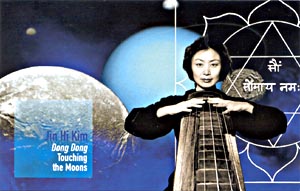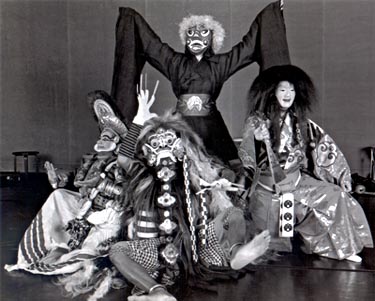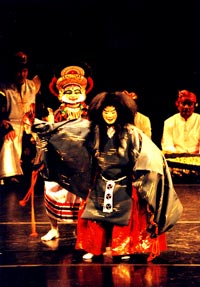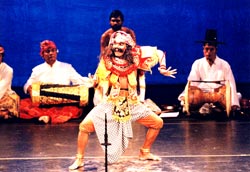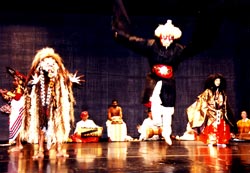One Sky
One Sky (scored for electric komungo and string orchestra) was broadcast on KBS-TV and Kim was featured on BBC Radio News, The World/Global Hit program about the premier, hosted by Marco Werman (August 3, 2005) http://www.theworld.org /globalhits/2005/08/03.shtml .
Ms. Kim's inspiration for the work is best explained in her own words:
"The political conflict between America, Iraq, and North Korea has enormous implications for the world. One Sky is my attempt to deliver a message that we (the world) live under and share one sky no matter how different our individual beliefs may be or what political boarders have been created."
Nong Rock
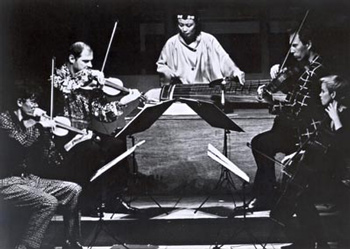
|
| Kim
with the Kronos Quartet for the premier of her Nong Rock,
1992 |
|
Critical Acclaims: Nong Rock (scored for string quartet and
komungo)
"Her
music is inspired by the delicately textured instrumental sounds of
her own country. It could never have been written by a native Californian
or New Yorker. It’s exotic. It’s different. It reflects
its culture in the same essential way that Beethoven’s quartet
reflected his time." David Harrington of KRONOS Quartet
"[Nong Rock]...Savoring the life of each richly inflected note."
Josef Woodard, Los Angeles Times "[Nong Rock] Kim juxtaposes and synthesizes the timbres, techniques and even styles of East and West in a way that is at once jarring and inevitable."
Dean Suzuki, Option Magazine
Eternal Rock
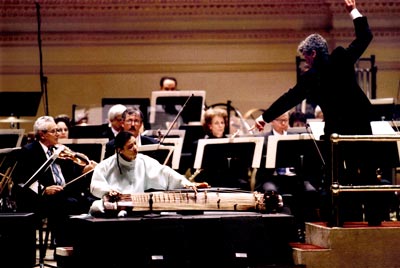
|
| Kim's
Eternal Rock with ACO conducted by Dante Anzolini |
| Critical Acclaims: Eternal Rock (scored for orchestra and komungo)
"[Eternal Rock] moved through the orchestra like a curious outsider, wondering at the range of sounds it can make and using it as an extension of twangy vocabulary of solo komungo." Anne Midgette, The New York Times
"Acoustically Eternal Rock is daring. It is not as westernized in that it doesn’t use traditional melodies, but it has a lot of bite and impact and it’s really visceral." Gil Rose, Conductor, Boston Modern Orchestra Project
Eternal
Rock II
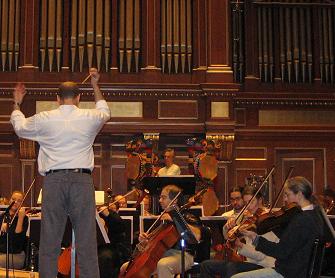 |
| Kim's
Eternal Rock II with BMOP conducted by Gil Rose |
|
Critical Acclaims : Eternal Rock II (scored for Korean barrel drum set and orchestra) "Some of the orchestral writing sounds like movie music,but the way that Kim extends the effect of the drums by additional percussionists ringed around the stage is striking." Richard Dyer, The Boston Globe | Dong Dong Touching The Moons
Touching the Moons (TTM), a multi-media lunar ritual in which Western technology meets Eastern mythology, won the Wolff Ebermann Prize for 2001 from International Theater Institute Conference in Munich, Germany. Conceived and composed by Jin Hi Kim, TTM bridged the diversity of ancient Asian traditional dance and music forms such as Indian kathak dance, Korean kagok singing, Indian tabla and Korean janggo drums with state-of-the-art digital imagery multi-media art, and MIDI sensors. The newly developed electric komungo (Korean 4th Century fretted board zither) also was featured with a MIDI computer system.
The piece was commissioned by the Kitchen in 2000 with major support from The National Endowment for the Arts in a consortium with Mass MoCA, and received the second performance at the Kennedy Center for Performing Arts in 2002 supported by the Korea Society. "Her unique vision blends science fiction images, state-of-the-art technology, ancient mythology and timeless music and dance traditions. No other artist is doing work quite like this, and she does it with superb style. Kim performs brilliantly and evocatively on an amplified komungo." Joseph McLellan, The Washington Post "Kim’s austere music centered the work.... (she) applied the techniques of “living tones” to sustained notes: filling them with vibrato, tightening them until they broke, using glottal stops to make them ripple like waves around a rock....She turned Korean court-orchestra music into a haze of distant fanfares and remembered rites, from a time when the moon was a divine power." Jon Pareles, The New York Times
Dragon Bond Rite Kim's widely acclaimed cross-cultural mask dance music theater, Dragon Bond Rite, featured internationally acclaimed virtuoso performers from Korea, Japan, India, Indonesia, Tuva and the U.S. Conceived and composed by Jin Hi Kim, Dragon Bond Rite breaks new ground in music theater for which Pan-Asian traditional drummers, vocalists, and masked dancers come together and blend their respective traditional elements of music, dance, and drama.
| It was commissioned by the Japan Society in 1997 through funds from Mary Flagler Cary Charitable Trust; and developed under the auspices of the Rockefeller Foundation MAP grant, the Walker Art Center (Minneapolis), the Rockefeller Foundation Bellagio Center (Italy) and Asian Cultural Council; and presented at the Festival of Asian Art in Hong Kong (China) and the Kennedy Center (Washington DC) supported by the Korea Society.
"[Dragon Bond Rite] cut across barriers of language, culture and tradition, touch us at deep, irrational levels, and result in a work that speaks to our common humanity." Joseph McLellan, The Washington Post "In Kim's score, the styles of the master musicians actually merge."
Deborah Jowitt, The Village Voice | | "The production's drummers were percussion virtuosos, and its singers displayed a remarkable range of vocal techniques, from high-pitched chanting to deep, awesome rumblings." Jack Anderson, The New York Times
Living Tones Lecture
Contact: International Performing Arts at KPAI@aol.com Ms. Kim will describe how each tone in traditional Korean music must be perceived as "alive, embodying its own individual shape, sound, texture, vibrato, glissando, expressive nuances and dynamics." She refers to this quality as "Living Tones," a compositional concept which she has developed over the past twenty years. The precise timbral persona of each tone generated is treated with an abiding respect, as its philosophical mandate from Buddhism, a reverence for the ‘life’ of tone, the color and nuance granted each articulation from Shamanism. Using CDs, scores, video/DVD and live komungo demonstration, Kim will discuss her various cross-cultural compositions. Critical Acclaims: Living Tones Compositions
Allan Kozinn of The New York Times wrote about Voices of Sigimse,
"A gorgeously tactile piece that moved easily between an earthy folksiness and meditative refinement." Paul Griffiths of The Times (London) wrote about Linking, "An essay in integration which suggested a Takemitsu-like ability to hover between eastern and western traditions." John Rockwell of The New York Times wrote about Linking, "The delicacy of her effects (and of the Kronos Quartet’s playing) were constantly riveting." Anne Midgette of The New York Times wrote, "[Eternal Rock] moved through the orchestra like a curious outsider, wondering at the range of sounds it can make and using it as an extension of twangy vocabulary of solo komungo." David Harrington of KRONOS Quartet wrote about Nong Rock, "Her music is inspired by the delicately textured instrumental sounds of her own country. It could never have been written by a native Californian or New Yorker. It’s exotic. It’s different. It reflects its culture in the same essential way that Beethoven’s quartet reflected his time."
|



